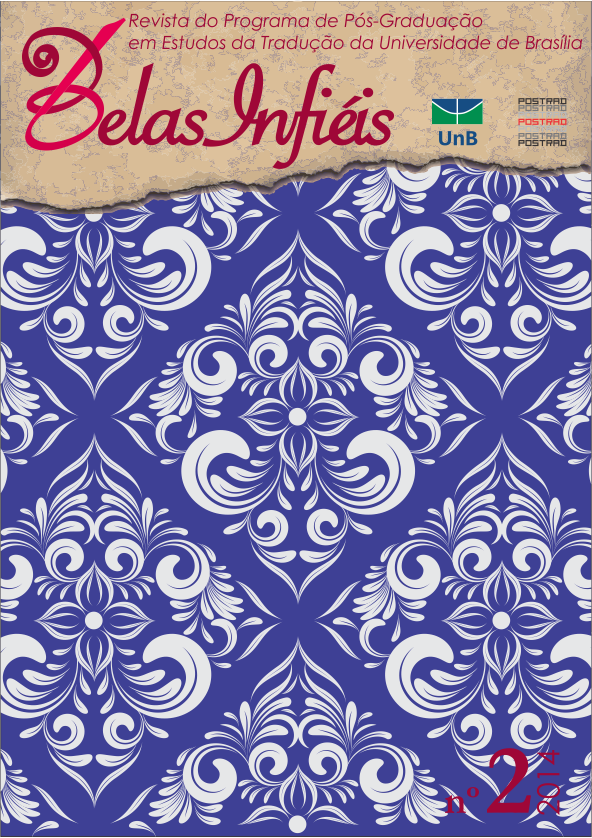TRADUÇÕES HARAGANAS:
DESAFIOS ÉTICOS EM FACE DA OBRA LITERÁRIA DE MARÍA LUÍSA BOMBAL
DOI:
https://doi.org/10.26512/belasinfieis.v3.n2.2014.11279Palabras clave:
ética da tradução, escrita feminina, estudos comparadosResumen
Este trabalho objetiva analisar as relações entre duas novelas da escritora chilena María Luísa Bombal e suas traduções ao português brasileiro tendo como ponto de partida postulados teóricos sobre ética da tradução obtidos em estudos de Berman, Venuti e Spivak.
Descargas
Citas
ALÓS, Anselmo Peres. A letra, o corpo e o desejo: masculinidades subversivas no romance latino-americano. Florianópolis: Ed. Mulheres, 2012. 240p.
ÁVILA, Eliana de Souza. Pode o tradutor ouvir? In: BLUME, Rosvitha Friesen; PETERLE, Patricia (Orgs). Tradução e relações de poder. Tubarão: Ed. Copiart/ Florianópolis: PGET/UFSC, 2013. 432p. 21-68.
BERMAN, Antoine. A tradução e a letra ou o albergue do longínquo. Tradução de Marie-Hélène Catherine Torres, Mauri Furlan e Andréia Guerini. Rio de Janeiro: 7Letras / PGET, 2007.144p.
BOMBAL, María Luísa. Aamortalhada. Tradução de Aurora Fornoni Bernardini e Alicia Ferrari del Pardo. Revisão de Adma Muhana. São Paulo: Difel, 1986. 84p.
_________. A última névoa.Tradução de Neide T. Maia González, e revisão de Vicente Cechelero. São Paulo: Difel, 1985.110p.
_______ . A última névoa e A amortalhada. Tradução de Laura Janina Hosiasson. São Paulo: Cosac Naify, 2013. 224p.
_________. Obras completas. Barcelona / Buenos Aires /México DF / Santiago de Chile: Editorial Andrés Bello, 1996. 456p.
IMBERT, EnriqueAnderson. Historia de la literatura hispanoamericana II”“época contemporánea. Ciudad de México: Fondo de Cultura Económica, 2000. 510p.
SPIVAK, Gayatri Chakravorty. Pode o subalterno falar?Tradução de Sandra Regina Goulart Almeida, Marcos Pereira Feitosa e André Pereira Feitosa. 1ª reeimp. Belo Horizonte: Editora UFMG, 2012. 174p.
___________. Tradução como cultura. Tradução de Eliana Ávila e Liane Schneider. Ilha do Desterro, Florianópolis, n. 48, p. 41-64, jan / jun.2005.
VENUTI, Lawrence. Escândalos da tradução: por uma ética da diferença. Tradução de Laureano Pelegrin el at. Bauru: EDUSC, 2002. 396p.
Descargas
Publicado
Cómo citar
Número
Sección
Licencia
Copyright Statement
Given the public access to this journal, the texts are free to use but requires the recognition of the original authorship and initial publication in this journal to be properly stated.
The journal allows the use of works published for non-commercial purposes, including the right to submit the work to publicly accessible databases. Published contributions are the sole and exclusive responsibility of the author(s).
- When submitting papers to be evaluated by the Belas Infiéis journal, the author(s):
- Declare that the contents of the contributions are original and of their original creation, being entirely responsible for their content if there is an objection by third parties.
- Claim to be aware that they should not commit academic plagiarism.
- Declare that the manuscript has not been published, completely or partially, in Portuguese or another language. If it is a translation it should be submitted to the Translated Articles section.
- Declare that the manuscript is not being evaluated by other journals.
- Declare that the manuscript was not submitted to another journal simultaneously.
- Commit(s) to inform the journal of any kind of error or inaccuracy in their contribution (published, in evaluation or in editing) and to collaborate with the editors to make due corrections of the article (when in evaluation or editing) or erratum/retraction (after publication).
- Declare that there is no conflict of interest regarding the published work.
- Authorize its release if it is accepted for publication without any kind of monetary compensation.
- Agree to assign non-exclusive rights to publication to the magazine, remaining free to make their contribution available in other media as long as the publication of the first version in Belas Infiéis magazine is mentioned. They also authorize Belas Infiéis to assign their texts for reproduction in content indexers, virtual libraries and similar platforms.
- Maintain copyright and grant the journal the right of first publication, the work being licensed under theCreative Commons Attribution License.
- Is/Are allowed and encouraged to publish and distribute their work online after the editorial process, which may increase the impact and citation of the published work.
- Authorize the editorial team to make textual adjustments and to adapt the article to the publication rules, when necessary.



















